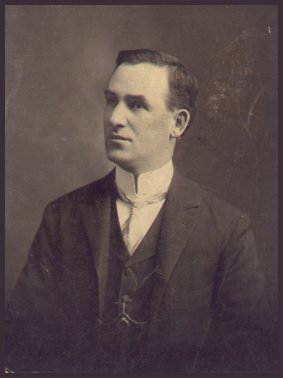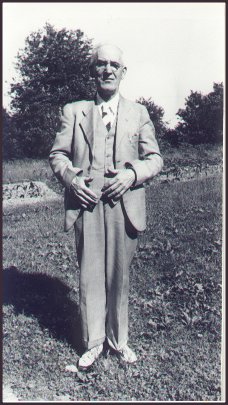No Brief Candle
A Family History Project
July 11, 2001
Wednesday
 My
maternal grandfather, Michael Patrick Dwyer, is pictured at left as a young
man, probably at the time of his wedding in 1901. He was born in 1864,
one of ten or so children of impoverished Irish immigrants. He left school
at ten to become a slag picker in the coal fields of Mahanoy City, Pennsylvania.
Bright and energetic, he educated himself, read widely,
and in his mid-twenties passed the government examination that made him
a mail carrier. It was his labor that supported his widowed mother
and his siblings, including the seminary training of his brother Will,
who died of consumption two months short of ordination. By the time
he was in his thirties, Mike was secure by coal region standards, and he
was able to marry and start his own family.
My
maternal grandfather, Michael Patrick Dwyer, is pictured at left as a young
man, probably at the time of his wedding in 1901. He was born in 1864,
one of ten or so children of impoverished Irish immigrants. He left school
at ten to become a slag picker in the coal fields of Mahanoy City, Pennsylvania.
Bright and energetic, he educated himself, read widely,
and in his mid-twenties passed the government examination that made him
a mail carrier. It was his labor that supported his widowed mother
and his siblings, including the seminary training of his brother Will,
who died of consumption two months short of ordination. By the time
he was in his thirties, Mike was secure by coal region standards, and he
was able to marry and start his own family.
He married Margaret Waters, a woman nearly fourteen
years younger than he. Their wedding took place in September of 1901, and
part of their wedding trip was spent watching President McKinley's funeral
train pass through Niagara Falls. Despite having this as a central honeymoon
memory, their union was happy, producing three children, of whom Rose,
the youngest and second daughter, became my mother.
 Rose
adored her father, and anything I know of him I know from her. He is pictured
at right a few months before he died in 1940. Not long after that my mother
had to leave a showing of the popular Academy Award winning movie Gone
With the Wind because Scarlett O'Hara's father reminded her too much
of her own. I wasn't born until 1947, and from the moment she knew she
was pregnant, my mother was determined to name her child Michael, to honor
him. When I turned out to be a girl, she called me Michael anyway, switching
to her mother's name only after friends implored her to think the matter
through.
Rose
adored her father, and anything I know of him I know from her. He is pictured
at right a few months before he died in 1940. Not long after that my mother
had to leave a showing of the popular Academy Award winning movie Gone
With the Wind because Scarlett O'Hara's father reminded her too much
of her own. I wasn't born until 1947, and from the moment she knew she
was pregnant, my mother was determined to name her child Michael, to honor
him. When I turned out to be a girl, she called me Michael anyway, switching
to her mother's name only after friends implored her to think the matter
through.
 Thus
my maternal grandfather is a shadowy figure, an idea rather than a person.
Nevertheless, I have something in his hand, a postcard he sent my mother
on September 4, 1940. The message, which is written in pencil, reads, "Dear
Rose, We came home last night. Mother had got through with what She wanted
to do for Mary and we brought Eddie up. John is down helping Jim on the
lot, and Mary is in the store. Mother and Eddie is gone to the show this
afternoon. Hoping you will have a nice week end I remain as ever, Your
Dad."
Thus
my maternal grandfather is a shadowy figure, an idea rather than a person.
Nevertheless, I have something in his hand, a postcard he sent my mother
on September 4, 1940. The message, which is written in pencil, reads, "Dear
Rose, We came home last night. Mother had got through with what She wanted
to do for Mary and we brought Eddie up. John is down helping Jim on the
lot, and Mary is in the store. Mother and Eddie is gone to the show this
afternoon. Hoping you will have a nice week end I remain as ever, Your
Dad."
Some things I know for facts, others I can deduce. September 4 was a
Wednesday that year. I suspect the picture was taken the previous weekend,
which was the Labor Day weekend. I have another which shows my grandparents
and other relatives along with my mother, gathered around her new car,
a black 1939 Chrysler. My grandfather is wearing the same suit, quite an
outfit for a sunny summer day. My mother remarked once that she had seen
her father only once without his vest and his collar in place. Mary is
their older daughter. She and her husband Jim live in Summit Hill, a small
town about twenty miles east of Mahanoy City. They operate a small general
store. I do not know who John is nor what "helping Jim on the lot" might
entail. Eddie is Mary and Jim's three year old son. The card is addressed
to my mother in Harrisburg, the capital city where she has been living
for four years
The postcard is an unremarkable document. It's a standard post office
issue, prestamped with one cent postage (a green engraving bearing a portrait
of Thomas Jefferson). I found it among the cartons of unsorted memorabilia
I acquired after my father died, and for a long time I wondered why my
mother would have bothered to keep it, since its message is unremarkable.
It was several years before it dawned on me -- this was the last thing
she had of him.
Although I live by the written word, I have not had occasion to exchange
many letters with members of my family. I attended college only forty miles
from my home town, my sister a different school ninety miles away. By then,
of course, there was the telephone, and more cars to travel over better
roads, and we never spent long periods apart. I do have one letter from
my father, sent in the summer of 1972 to Duke University, where I was studying
Shakespeare. It's a letter not unlike the postcard in that it doesn't say
very much, certainly nothing of lasting significance. It is remarkable
only for the fact that he has spelled my name wrong, writing "Margie" for
"Margy" (which, if you please, is pronounced with a hard g), an
understandable mistake for one who had certainly never seen my nickname
written down.
We have e-mail now, of course, and after I finish this piece I will
compose such a note to my daughter, now enjoying two weeks at camp. I've
urged her father to write something as well. It won't be in his hand, but
I know she saves these missives, which the camp staff print out and distribute
each morning, all the electronic routing headers intact. In this regard
e-mails are even less aesthetically pleasing than a yellowed penny postcard.
But what they represent is invaluable.
(Previous
-- Next)
This journal updates irregularly.
To learn when new pieces are added,
join
my Notify List.
Return
to The Silken Tent Main Page
Return
to No Brief Candle Index
The
contents of this page are © 2001 by Margaret DeAngelis.
This
site is hosted by Dreamhost.
They're dreamy!
 My
maternal grandfather, Michael Patrick Dwyer, is pictured at left as a young
man, probably at the time of his wedding in 1901. He was born in 1864,
one of ten or so children of impoverished Irish immigrants. He left school
at ten to become a slag picker in the coal fields of Mahanoy City, Pennsylvania.
Bright and energetic, he educated himself, read widely,
and in his mid-twenties passed the government examination that made him
a mail carrier. It was his labor that supported his widowed mother
and his siblings, including the seminary training of his brother Will,
who died of consumption two months short of ordination. By the time
he was in his thirties, Mike was secure by coal region standards, and he
was able to marry and start his own family.
My
maternal grandfather, Michael Patrick Dwyer, is pictured at left as a young
man, probably at the time of his wedding in 1901. He was born in 1864,
one of ten or so children of impoverished Irish immigrants. He left school
at ten to become a slag picker in the coal fields of Mahanoy City, Pennsylvania.
Bright and energetic, he educated himself, read widely,
and in his mid-twenties passed the government examination that made him
a mail carrier. It was his labor that supported his widowed mother
and his siblings, including the seminary training of his brother Will,
who died of consumption two months short of ordination. By the time
he was in his thirties, Mike was secure by coal region standards, and he
was able to marry and start his own family.
 Rose
adored her father, and anything I know of him I know from her. He is pictured
at right a few months before he died in 1940. Not long after that my mother
had to leave a showing of the popular Academy Award winning movie Gone
With the Wind because Scarlett O'Hara's father reminded her too much
of her own. I wasn't born until 1947, and from the moment she knew she
was pregnant, my mother was determined to name her child Michael, to honor
him. When I turned out to be a girl, she called me Michael anyway, switching
to her mother's name only after friends implored her to think the matter
through.
Rose
adored her father, and anything I know of him I know from her. He is pictured
at right a few months before he died in 1940. Not long after that my mother
had to leave a showing of the popular Academy Award winning movie Gone
With the Wind because Scarlett O'Hara's father reminded her too much
of her own. I wasn't born until 1947, and from the moment she knew she
was pregnant, my mother was determined to name her child Michael, to honor
him. When I turned out to be a girl, she called me Michael anyway, switching
to her mother's name only after friends implored her to think the matter
through.
 Thus
my maternal grandfather is a shadowy figure, an idea rather than a person.
Nevertheless, I have something in his hand, a postcard he sent my mother
on September 4, 1940. The message, which is written in pencil, reads, "Dear
Rose, We came home last night. Mother had got through with what She wanted
to do for Mary and we brought Eddie up. John is down helping Jim on the
lot, and Mary is in the store. Mother and Eddie is gone to the show this
afternoon. Hoping you will have a nice week end I remain as ever, Your
Dad."
Thus
my maternal grandfather is a shadowy figure, an idea rather than a person.
Nevertheless, I have something in his hand, a postcard he sent my mother
on September 4, 1940. The message, which is written in pencil, reads, "Dear
Rose, We came home last night. Mother had got through with what She wanted
to do for Mary and we brought Eddie up. John is down helping Jim on the
lot, and Mary is in the store. Mother and Eddie is gone to the show this
afternoon. Hoping you will have a nice week end I remain as ever, Your
Dad."